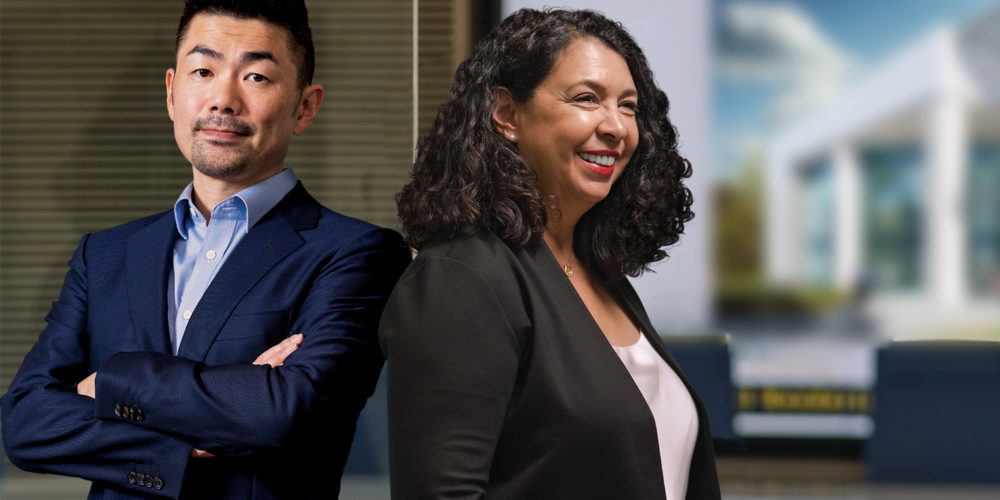Embry-Riddle is elevating its efforts when it comes to answering the great challenges facing aviation and aerospace, thanks to two new appointments to the university’s Presidential Faculty Research Fellowship program. Each of these scholars and researchers will advance the work and reputation of the university’s centers of excellence focused on aerospace resilience and aviation and aerospace safety.
Dr. Kenji Yoshigoe and Dr. Barbara Holder are the university’s first Presidential Research Fellows, and the challenges they are exploring — from automated monitoring and tracking of aviation operations to understanding how pilots think — have the potential to change the way our aviation systems operate.
President P. Barry Butler introduced the faculty research fellowship program to expand research capabilities, enhance graduate programs and attract nationally recognized faculty.
“Both of our Presidential Research Fellows embody and elevate our focus on discovery-driven, interdisciplinary learning,” Butler says. “We are excited to welcome them and look forward to the meaningful innovations their programs will produce.”
Kenji Yoshigoe: Automating Aviation Efficiencies
As part of the Center for Aerospace Resilience (CAR) at Embry-Riddle, Yoshigoe will support CAR’s mission to provide responsive, cost-effective safety, security and reliability solutions that make aviation and aerospace systems more resilient.
Yoshigoe leads a $300,000 research project for the Florida Department of Transportation (FDOT) Aviation Office and a $340,000 research project for the U.S. Federal Aviation Administration (FAA).
For FDOT, he is investigating automated monitoring of takeoff, landings and other airport operations. Staff in air traffic control towers collect operations data, but only nine of Florida’s 129 public-use airports have full-time staff working in a tower. Accurate operations data are critical for informing airport master plans, schedules, staffing and funding decisions. Yoshigoe’s work assesses technology-based solutions, guided by a self-developed ranking followed by actual system evaluation. FDOT will draw on his findings to update its 2018 Operations Counting on Non-Towered Airports Assessment.
“You can’t just look at technologies in the aviation domain. You need to look around for some solution that is a best-use case, maybe in a totally different field. You could get some hints about an approach to your problem that no one else has imagined.”
— Kenji Yoshigoe
Yoshigoe’s FAA-funded research evaluates technologies that could help air traffic controllers track spacecraft and drones as well as aircraft. This effort supports the FAA vision for an Info-Centric National Airspace System.
As a professor in the department of Electrical Engineering and Computer Science, Yoshigoe draws on experience that includes oversight of a National Science Foundation-funded supercomputer center and the development of wireless sensor networks to support the Internet of Things. This expertise is an asset to the development of solutions across the aviation and aerospace ecosystem that the Center for Aerospace Resilience is undertaking.
Aviation poses new challenges to Yoshigoe, who has no background in the field. However, he sees his fresh perspective as a blank slate that can lead to new ways of thinking.
“You can’t just look at technologies in the aviation domain,” he says. “You need to look around for some solution that is a best-use case, maybe in a totally different field. You could get some hints about an approach to your problem that no one else has imagined.”
Barbara Holder: Tracking the Minds of Pilots
How do pilots think? How can understanding their thinking help us develop safer and more efficient aviation systems and procedures? Holder is finding out, with nine patents and multiple scholarly publications advancing the study of human factors in aviation.
She will apply this growing body of knowledge in her new role as chief scientist and associate director of the Center for Aviation and Aerospace Safety. In addition to being second-in-command at the center, she is an associate professor in the College of Aviation in Daytona Beach.
Holder knows a little about how pilots think firsthand. She is a pilot herself. She has observed military, commercial and transport pilots on the job to determine how they use, understand and interact with technologies on the flight deck.
This technique – cognitive ethnography – captures the thought processes behind flying and yields insights that improve flight training and support to pilots. For example, Holder guided the design of 787 flight deck systems and redesigned the Boeing Quick Reference Handbook manual that pilots use to respond to emergency and non-normal events.
While serving as a fellow in advanced technology at Honeywell Aerospace, Holder studied human-machine issues across a range of aircraft. She also spent 15 years with The Boeing Company as an associate technical fellow and lead scientist of the Flight Deck Concept Center.
At NASA Ames Research Center, her post-doctoral research focused on how pilots understand the auto-flight system of the Airbus A320 while flying the line.
Holder is chair of the FAA’s Human Factors Subcommittee to the Research, Engineering and Development Advisory Committee and its Air Carrier Training Aviation Rulemaking Committee’s Flight Path Management Working Group. She is also a fellow of the Royal Aeronautical Society.
Describing herself as “a researcher of real-world cognition in complex sociotechnical systems,” her big-picture goal is to create a university-wide research center that explores the relationships between people and technology.
